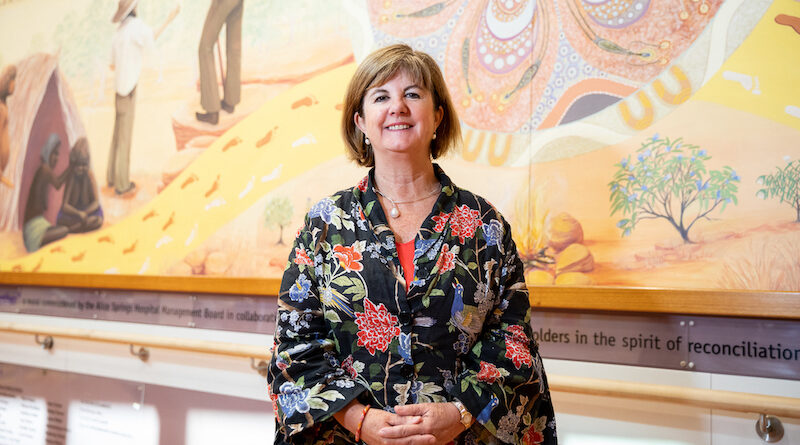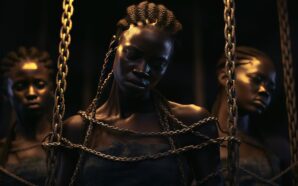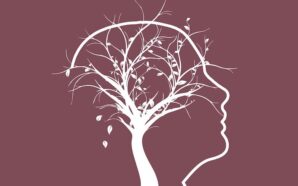This interview is a part of Ananke's special spotlight edition celebrating The Fred Hollows Foundation's 30 years of change making. You can check out the magazine here.
Tell us about yourself and how did your love for international development and community service begin? What was your inspiration?
Well, I have to tell you that the inspiration was my family. My parents are my inspiration because they were very passionate about social justice and empathy. I was born into a family where it was central to remember that every life was and is of equal value. This is what they taught me and they treated everyone, regardless of their social status, with respect.
I think it is also a natural extension then to contemplate that if every life is of equal value, why do we have so many people, 800 million people for example, going to bed hungry. You know, some of the injustices in the world, it just does not seem right. And so it was with that passion that really drove me to be involved in community work. I was fortunate to have lived in Japan during my school and university days. I was going to become a doctor and even got accepted. Going to Japan, learning the language and working internationally really gave me a sense of what I really wanted to do, which was global diplomacy, international trade or development.
And then I embarked on studying economics, law as well as languages and became part of our diplomatic service for many years. So you can see from my early childhood, I’ve always been interested in how to make the world a better place. I’ve had the opportunity to do what I love through my family, career that I’ve had in the government, and now also through my involvement with community projects and great organizations like The Fred Hollows Foundation. To do just a little bit to help make the world better.
Keeping in mind your immense body of work, how important is the connection between public policy, diplomacy and international development and why?
I think it’s incredibly connected because we’re all connected as global citizens. The changes that we’ve had, including things like technology and travel or even disease burden means that all of us are on this one planet together. So the links between diplomacy and international development, I believe, are very strong. I think now when we are coming out of COVID, it’s particularly critical that we think about where we are as communities. Where we are as a global society, especially when challenges are on the rise. Food security has worsened during COVID. The burden of gender has really exacerbated during the pandemic. I feel that we’re almost at a tilting point in terms of human suffering. But over the next 12 to 24 months, we’ve really got an opportunity to try and claw back some of the gains that we had sadly lost during COVID. Hopefully, we continue trying to get towards sustainable development goals otherwise we will start to spiral downwards and further decrease our global potential.
You have quoted Fred Hollows famous comment in an interview, “We discover our own humanity when we help others…” how in your opinion has the Foundation enabled and incorporated this beautiful ideal in its work and vision?
It’s not just the work that the Fred Hollows Foundation does, it is also the philosophy that’s so special. All of us on the board, at different levels, are inspired by the many wonderful quotations from Professor Hollows who himself was a great humanitarian.
Working with the Foundation on and off for over 30 years and then joining the board about two years ago, you get to witness a legacy that is monumental. You get to experience how the entire organization is guided by Fred. In board meetings, especially when we are looking for solutions, we often say what would Fred do. There is another quotation where he said ‘teach the teachers first and they teach others.’
I think it’s really influential in shaping where we work and how we work. Our priority at the Foundation is strengthening health systems and we’re using that philosophy, for example, of working with communities and the teachers to really drive the public health messages on the ground.
It is really important to understand that if even good work is being done on the fly, it doesn’t strengthen the community. We want to work with communities sustainably which essentially means that when Fred Hollows people leave, the communities are empowered to continue and then teach other communities. It’s very much about driving change in terms of building health systems with the communities themselves generating and improving their own health outcomes.
What is your vision for the Fred Hollows Foundation?
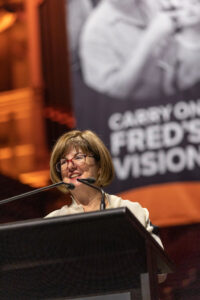
CREDIT MICHAEL AMENDOLIA
On the 30th of August 2022, The Fred Hollows Foundation held a 30th Anniversary celebration at Sydney Town Hall.
Notable guests include the board, CEO, Lisa Wilkinson, ambassadors including Susie O’Neill, Ray Martin, Cam Hollows, Rosa Hollows, Anne-Louise Hollows.
The Fred Hollows Foundation and partner staff on the panel included: Kelvin Storey, Jane Ohuma, Kris Rallah-Baker, and Dr Phuc Huynh.
Choir performing: Endeavour Harmony Chorus.
This may sound a bit predictable, but I do think we have this strong vision about a world in which no one is needlessly blind. And it is my vision, absolutely! If you can make a difference, you should step up and try and make the difference.
We have people who are blind or vision impaired and just through a small effort, a very small financial amount, these individuals can lead a more productive life. While the number of people going blind is decreasing, the burden of vision impairment is increasing globally and we are still so far behind this vision of realizing a world where no one is needlessly blind and to achieve this, we need to keep on at it… working for this vision continuously.
What in your opinion are some of the most significant challenges in the international development sector and by extension in the field of eye health?
OK, that’s a huge question. you know here we are in late 2022 and after all my reading and assessment of the UN’s work and the World Health Organization. We’ve really got a major setback from COVID, disrupting people’s lives and livelihoods. Progress was slow even before we had COVID; but the new reality that the UN estimates is presently 120 million more people have been pushed back into poverty. There are those who might say these are just statistics. But, when you consider even one life being impacted by unnecessary poverty and then think of the 120 million people suffering, it’s a terrible thing. There’s lots and lots of demand on International Development. But I do think eye sight is really important and we’ve got lots of research from The Lancet, the UN, WHO showing that it’s a really cost effective means of unlocking human potential.
So if someone from a marginalized community becomes blind through an infectious disease or other things; and you help that person through for instance a small donation to help with the surgery; you are actually giving that person, man or woman or child the potential to be more productive in the community. This is how you enable them to move out of the poverty cycle.
Based on all the work and research, we know for a fact that eye health is very cost effective. At the Foundation, our commitment is to strive and make sure no one is needlessly blind or vision impaired. As long as we keep on fund raising, getting good sponsorships, support and getting the word out, we can achieve this vision.
The Foundation is working with governments and international funders. Eye health needs a lot of action at multiple levels and that is exactly where the Foundation is striving to scale. We are already active in over 30 countries and do a lot of international public health messaging for example through The Lancet. The other thing I really want to say is the sustainable development approach to the work we’re doing is critical. For the Foundation, sustainable development principles in everything we do is really important. We don’t just go in and fix eyes and then leave. It’s about making sure that the public health messages are there, the community is trained and the community is then able to also train others so that there’s a long lasting empowered approach to the eye health.
The Foundation has played a pivotal role in raising awareness about gender inequality that exists as far as avoidable blindness is concerned. We would love to know how it is affecting women and girls especially across the Global South.
One of my other roles is presiding over the National Foundation for Australian Women. I’m a very proud to call myself a feminist. I believe men and women should be equal. And when we come to eye health, across every region in the world, women are more likely to be blind than men. About 90 percent of those people who are blind are living in poverty. They’ve got nearly every form of blindness and vision challenges. Vision impaired women are not equal to men. They perform much more. Now 55 percent of the world’s blind and vision impaired are females. And that’s true in every region, in the South but also in developed countries. Women are more likely to be vision impaired and there are a lot of reasons such as biology. You know, women do live longer so they’re more likely to get some of the longer term eye ailments.
Eye health diseases like cataract can be rectified. We have to work with young and old women and of course men too. But you know, the cost is often a deterrent for women to get the help they need. The treatments particularly in many of the Global South countries are prioritized for the care and upkeep of the man’s health because he is traditionally considered the bread winner or maintains a high status. There are cultural factors such as women usually not having a say in decision making or are not allowed to travel. With the assumption of care-work being a woman’s prerogative, it is always the woman – the mother, sister, wife etc. – who are putting others in front of them so they end up getting less good outcomes for themselves.
If you look at trachoma, which is such a terrible disease. Again, it impacts women more and because they look after their kids, they pass on the disease to their children and vice versa. This is yet another vicious cycle we are trying to break.
We’ve got all these factors working against women and gender equality. Our stream of work at the Fred Hollows Foundation is naturally one I’m very proud of. It is one I’m really pushing and trying to make sure that we build a world where no one is blind or vision impaired needlessly and that strategy includes when men and women have equal access.
Through your own work at the Foundation, what kind of gender disparities have you witnessed as far as eye health is concerned?
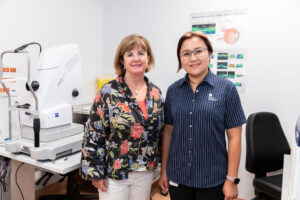
Dr Jane Madden visits Alice Springs and meets with Indigenous Australia Program partners from Alice Springs Hospital and Aboriginal Medical Services Alliances Northern Territory (AMSANT).
I have had the opportunity to work in many countries across the world. I have been in places like Zambia, Zimbabwe, Malawi and you know, it was shocking to see some of the circumstances. Women are many a times relegated to the back of cabins or tents because of their eye problems. I’ve seen firsthand where the mother is vision impaired and children miss out on going to school. Sometimes the mother does not have the strength to organize or the courage and confidence to make the decision. So you get another cycle of poverty starting because less educated children will be more likely unable to have productive working lives and break out of poverty.
At the Foundation, we have ambassadors and champions from within the community. When you have women and girls representing you as champions of the cause, they are also championing gender equality. This is really exciting and positive. This is how the Foundation puts gender and equity at the heart of their programs focusing public health.\
We hope that all those who need eye care can and should receive it. So we’ve got to make sure that we’re equitable in terms of trying to get access for women and girls as well as men.
What are some of the most crucial steps that need to be taken to achieve gender equity when it comes to eye care. How does vision impairment or avoidable blindness impact gender equality and equity?
We go to the guiding principles of sustainable development such as SDG 5 which focuses on achieving gender equality and empowering all women and girls. We are trying to use that as a rallying point to unlock new financing, through strong female entrepreneurs, women who really care passionately about gender. I cannot reiterate it enough. We are in 2022 worse off than we were two years ago because the COVID pandemic. It’s the additional burden on the women that’s really been a long lasting. At the Foundation, we are really trying to embed it in everything we do.
In Pakistan and Bangladesh, we’re training outreach health workers who deliver maternal and child health services. Those outreach health workers may not have expertise in eye health. But they are the ones who are connecting with the communities, talking to women and girls. They are the ones going to the back of the cabin or hut, and seeing the poor woman who is lying there, ostracized by her community and not able to get an education. Community workers are the catalyst; ensuring that the ecosystem of care reaches in places where it doesn’t otherwise. And this is one of the many way we are, directly and indirectly, lifting women and girls and improving their health outcomes.
Before we end this interview, I really wanted to know what was it like to be in the same room with Nelson Mandela. Could you tell us about your experience.
I have the great fortune of meeting him many, many times actually but the really powerful moment I met him was the day he came out from prison. I was invited by Archbishop Tutu to have breakfast with a small group of friends, ambassadors and the Mandela family.
It was at Bishop Tutu’s home in Cape Town. The whole world was waiting to see what this man was like and what he was going to say. After exchanging pleasantries, he asked me what it was like to be in South Africa as a young Australian diplomat. Now here is a man who has the world transfixed on him and he was taking kind enough to ask about my experiences. It only reconfirmed my conviction of his greatness as a world leader. He was a man of great humility and curiosity, attributes not many in his position possess. Many are filled with arrogance but not Mandela. He was always caring and thinking of others.
In the end, I would just like to conclude that it’s the humanitarian approach with which the Foundation works that really makes me feel honored and privileged to be the chair of this wonderful organization.
The Interview is lightly edited for clarity.
Images courtesy: The Fred Hollows Foundation




